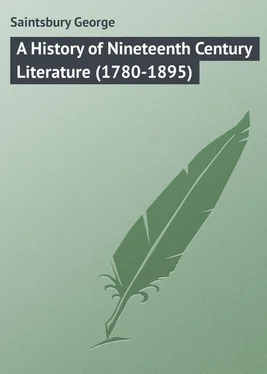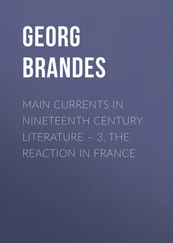George Saintsbury - A History of Nineteenth Century Literature (1780-1895)
Здесь есть возможность читать онлайн «George Saintsbury - A History of Nineteenth Century Literature (1780-1895)» — ознакомительный отрывок электронной книги совершенно бесплатно, а после прочтения отрывка купить полную версию. В некоторых случаях можно слушать аудио, скачать через торрент в формате fb2 и присутствует краткое содержание. ISBN: , Жанр: foreign_prose, на английском языке. Описание произведения, (предисловие) а так же отзывы посетителей доступны на портале библиотеки ЛибКат.
- Название:A History of Nineteenth Century Literature (1780-1895)
- Автор:
- Жанр:
- Год:неизвестен
- ISBN:http://www.gutenberg.org/ebooks/31698
- Рейтинг книги:5 / 5. Голосов: 1
-
Избранное:Добавить в избранное
- Отзывы:
-
Ваша оценка:
- 100
- 1
- 2
- 3
- 4
- 5
A History of Nineteenth Century Literature (1780-1895): краткое содержание, описание и аннотация
Предлагаем к чтению аннотацию, описание, краткое содержание или предисловие (зависит от того, что написал сам автор книги «A History of Nineteenth Century Literature (1780-1895)»). Если вы не нашли необходимую информацию о книге — напишите в комментариях, мы постараемся отыскать её.
A History of Nineteenth Century Literature (1780-1895) — читать онлайн ознакомительный отрывок
Ниже представлен текст книги, разбитый по страницам. Система сохранения места последней прочитанной страницы, позволяет с удобством читать онлайн бесплатно книгу «A History of Nineteenth Century Literature (1780-1895)», без необходимости каждый раз заново искать на чём Вы остановились. Поставьте закладку, и сможете в любой момент перейти на страницу, на которой закончили чтение.
Интервал:
Закладка:
One, however, of these minor writers has too much of what has been called "the interest of origins" not to have a paragraph to himself. William Gilpin, who prided himself on his connection with Bernard Gilpin, the so-called "Apostle of the North" in the sixteenth century, was born at Carlisle. But he is best known in connection with the New Forest, where, after taking his degree at Oxford, receiving orders, and keeping a school for some time, he was appointed to the living of Boldre. This he held till his death in 1814. Gilpin was not a secularly-minded parson by any means; but his literary fame is derived from the series of Picturesque Tours ( The Highlands , 1778; The Wye and South Wales , 1782; The Lakes , 1789; Forest Scenery , 1791; and The West of England and the Isle of Wight , 1798) which he published in the last quarter of the century. They were extremely popular, they set a fashion which may be said never to have died out since, and they attained the seal of parody in the famous Dr. Syntax of William Combe (1741-1823), an Eton and Oxford man who spent a fortune and then wrote an enormous amount of the most widely various work in verse and prose, of which little but Syntax itself (1812 sqq. ) is remembered. Gilpin himself is interesting as an important member of "the naturals," as they have been oddly and equivocally called. His style is much more florid and less just than Gilbert White's, and his observation correspondingly less true. But he had a keen sense of natural beauty and did much to instill it into others.
In all the work of the time, however, great and small, from the half-unconscious inspiration of Burns and Blake to the common journey-work of book-making, we shall find the same character – incessantly recurring, and unmistakable afterwards if not always recognisable at the time – of transition, of decay and seed-time mingled with and crossing each other. There are no distinct spontaneous literary schools: the forms which literature takes are either occasional and dependent upon outward events, such as the wide and varied attack and defence consequent upon the French Revolution, or else fantastic, trivial, reflex. Sometimes the absence of any distinct and creative impulse reveals itself in work really good and useful, such as the editing of old writers, of which the labours of Malone are the chief example and the forgeries of Ireland the corresponding corruption; or the return to their study æsthetically, in which Headley, a now forgotten critic, did good work. Sometimes it resulted in such things as the literary reputation (which was an actual thing after a kind) of persons like Sir James Bland Burges, Under-Secretary of State, poetaster, connoisseur, and general fribble. Yet all the while, in schools and universities, in London garrets and country villages, there was growing up, and sometimes showing itself pretty unmistakably, the generation which was to substitute for this trying and trifling the greatest work in verse, and not the least in prose, that had been done for two hundred years. The Lyrical Ballads of 1798, the clarion-call of the new poetry, so clearly sounded, so inattentively heard, might have told all, and did tell some, what this generation was about to do.
CHAPTER II
THE NEW POETRY
The opening years of the eighth decade of the eighteenth century saw, in unusually close conjunction, the births of the men who were to be the chief exponents, and in their turn the chief determining forces, of the new movement. The three greatest were born, Wordsworth in 1770, Scott in 1771, and Coleridge in 1772; Southey, who partly through accident was to form a trinity with Wordsworth and Coleridge, and who was perhaps the most typical instance of a certain new kind of man of letters, followed in 1774; while Lamb and Hazlitt, the chief romantic pioneers in criticism, Jeffrey and Sydney Smith, the chief classical reactionaries therein, were all born within the decade. But the influence of Scott was for various reasons delayed a little; and critics naturally come after creators. So that the time-honoured eminence of the "Lake Poets" – Wordsworth, Coleridge, and Southey – need not be disturbed.
The day of the birth of William Wordsworth was the 7th of April, the place Cockermouth. His father was an attorney, and, as Lord Lonsdale's agent, a man of some means and position; but on his death in 1783 the eccentric and unamiable character of the then Lord Lonsdale, by delaying the settlement of accounts, put the family in considerable difficulties. Wordsworth, however, was thoroughly educated at Hawkshead Grammar School and St. John's College, Cambridge, where he took his B.A. degree in 1791. He travelled in France, and for a time, like many young men, was a fervent Republican; but, like all the nobler of those who had "hailed the dawn of the French Revolution," he lived to curse its noon. He published early, his first volume of poems bearing the date 1793; but, though that attention to nature which was always his chief note appeared here, the work is not by any means of an epoch-making character. He was averse from every profession; but the fates were kind to him, and a legacy of £900 from his friend Raisley Calvert made a man of such simple tastes as his independent, for a time at least. On the strength of it he settled first at Racedown in Dorset, and then at Alfoxden in Somerset, in the companionship of his sister Dorothy; and at the second of the two places in the neighbourhood of Coleridge. Massive and original as Wordsworth's own genius was, it is almost impossible to exaggerate the effect, both in stimulus and guidance, of the influence of these two; for Dorothy Wordsworth was a woman of a million, and Coleridge, marvellous as were his own powers, was almost more marvellous in the unique Socratic character of his effect on those who possessed anything to work upon. The two poets produced in 1798 the Lyrical Ballads , among the contents of which it is sufficient to mention Tintern Abbey and The Ancient Mariner; and they subsequently travelled together in Germany. Then Wordsworth returned to his native lakes and never left them for long, abiding first at or near Grasmere, and from 1813 at his well-known home of Rydal Mount. When Lord Lonsdale died in 1802, his successor promptly and liberally settled the Wordsworth claims. The poet soon married his cousin Mary Hutchinson; and Lord Lonsdale, not satisfied with atoning for his predecessor's injustice, procured him, in the year of his migration to Rydal, the office of Distributor of Stamps for Westmoreland – an office which was almost a sinecure, and was, for a man of Wordsworth's tastes, more than amply paid. It is curious, and a capital instance to prove that the malignity of fortune has itself been maligned, that the one English poet who was constitutionally incapable of writing for bread never was under any necessity to do so. For full sixty years Wordsworth wandered much, read little, meditated without stint, and wrote, though never hurriedly, yet almost incessantly. The dates of his chief publications may be best given in a note. 3 3 Lyrical Ballads , 1798, and with additions 1800; Poems , 1807 (in these four volumes even adorers have allowed all his greatest work to be included); The Excursion , 1814; The White Doe of Rylston , 1815; Sonnets on the River Duddon , and others, 1819-20. In 1836 he brought out a collected edition of his poems in six volumes. The Prelude was posthumous.
For some years his poems were greeted by the general public and by a few of its critical guides with storms of obloquy and ridicule; but Wordsworth, though never indifferent to criticism, was severely disdainful of it, and held on his way. From the first the brightest spirits of England had been his passionate though by no means always undiscriminating admirers; and about the end of the first quarter of the century the public began to come round. Oxford, always first to recognise, if not always first to produce, the greatest achievements of English literature, gave him its D.C.L. in 1839. He received a pension of £300 a year in 1842 from Sir Robert Peel, who, unlike most English Prime Ministers, cared for men of letters; the laureateship fell to him in right of right on Southey's death in 1843, and he died on the 23rd of April 1850, having come to fourscore years almost without labour, and without many heavy sorrows.
Интервал:
Закладка:
Похожие книги на «A History of Nineteenth Century Literature (1780-1895)»
Представляем Вашему вниманию похожие книги на «A History of Nineteenth Century Literature (1780-1895)» списком для выбора. Мы отобрали схожую по названию и смыслу литературу в надежде предоставить читателям больше вариантов отыскать новые, интересные, ещё непрочитанные произведения.
Обсуждение, отзывы о книге «A History of Nineteenth Century Literature (1780-1895)» и просто собственные мнения читателей. Оставьте ваши комментарии, напишите, что Вы думаете о произведении, его смысле или главных героях. Укажите что конкретно понравилось, а что нет, и почему Вы так считаете.












